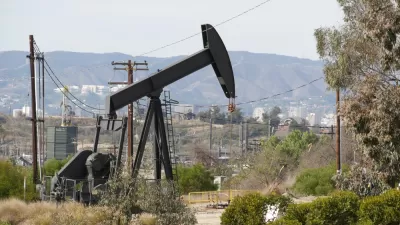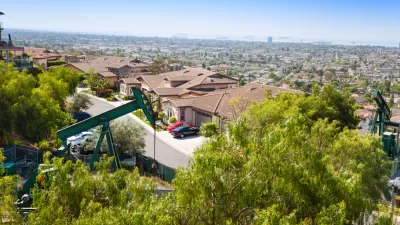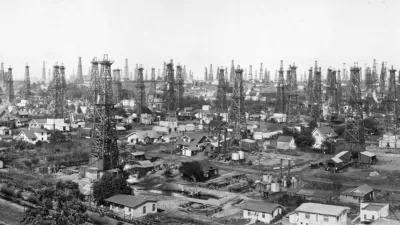The long history of oil extraction in the nation's most populous county is entering its final chapter.

"Los Angeles County took the first steps toward winding down oil extraction in unincorporated areas, reports Dharna Noor of a decision by the County Board of Supervisors earlier this week. Unincorporated areas account for 65 percent of the county's land area.
The vote prohibits the permitting of new oil wells and launches a process to evaluate existing oil wells. "Currently, existing oil wells cannot legally be shuttered until owners recoup the costs of drilling, so the evaluation will determine if costs have been recouped for each site," explains Noor.
"The measure would also designate all existing oil and gas extraction activities as 'nonconforming' uses, which could allow county officials to revoke drilling permits."
The new law has the potential to shut down 1,600 wells, including the 1,000-acre Inglewood Oil Field—the largest urban oil field in the United States. "More than 1 million people live within a 5-mile (8-kilometer) radius of the field, including several neighborhoods that are mostly populated by people of color," according to Noor.
The article includes details about the environmental and public health risk of urban oil extraction—making the county's vote a historic environmental justice victory.
Additional coverage of the vote is available in a separate article by Drew Costley.
FULL STORY: The Beginning of the End of Oil Is Here for Los Angeles County

Planetizen Federal Action Tracker
A weekly monitor of how Trump’s orders and actions are impacting planners and planning in America.

Restaurant Patios Were a Pandemic Win — Why Were They so Hard to Keep?
Social distancing requirements and changes in travel patterns prompted cities to pilot new uses for street and sidewalk space. Then it got complicated.

Map: Where Senate Republicans Want to Sell Your Public Lands
For public land advocates, the Senate Republicans’ proposal to sell millions of acres of public land in the West is “the biggest fight of their careers.”

Maui's Vacation Rental Debate Turns Ugly
Verbal attacks, misinformation campaigns and fistfights plague a high-stakes debate to convert thousands of vacation rentals into long-term housing.

San Francisco Suspends Traffic Calming Amidst Record Deaths
Citing “a challenging fiscal landscape,” the city will cease the program on the heels of 42 traffic deaths, including 24 pedestrians.

California Homeless Arrests, Citations Spike After Ruling
An investigation reveals that anti-homeless actions increased up to 500% after Grants Pass v. Johnson — even in cities claiming no policy change.
Urban Design for Planners 1: Software Tools
This six-course series explores essential urban design concepts using open source software and equips planners with the tools they need to participate fully in the urban design process.
Planning for Universal Design
Learn the tools for implementing Universal Design in planning regulations.
Heyer Gruel & Associates PA
JM Goldson LLC
Custer County Colorado
City of Camden Redevelopment Agency
City of Astoria
Transportation Research & Education Center (TREC) at Portland State University
Camden Redevelopment Agency
City of Claremont
Municipality of Princeton (NJ)





























